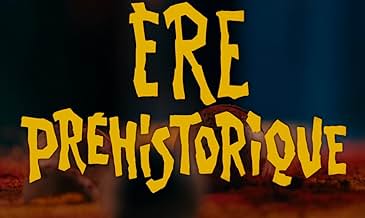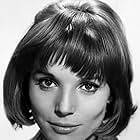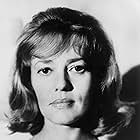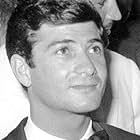IMDb RATING
5.4/10
649
YOUR RATING
A collection of sketches that tells the story of prostitution through the ages.A collection of sketches that tells the story of prostitution through the ages.A collection of sketches that tells the story of prostitution through the ages.
Michèle Mercier
- Brit (segment "Ère préhistorique")
- (as Michele Mercier)
Gabriele Tinti
- L'uomo del mar (segment "Ère préhistorique")
- (as Gabriel Tinti)
Gastone Moschin
- Flavius (segment "Nuits romaines")
- (as Gaston Moschin)
Storyline
Did you know
- TriviaRaquel Welch is dubbed in French.
Featured review
There are any number of reasons why someone might be interested in seeing this film.
The premise probably isn't one of them: it's a comedy about the history of prostitution in six episodes. The credits are the attraction: One of the segments is directed by Godard and features his usual star/spouse Anna Karina. Another is by Philippe de Broca with Jeanne Moreau and Jean-Claude Brialy. Other cast members include Raquel Welch, Elsa Martinelli, Marcel Dalio in one of his last roles, and Jean-Pierre Léaud who has so often played François Truffaut's alter ego, Antoine Doinel, and is one of the fully clothed characters from "Last Tango in Paris" (1972). There's Disappointment #1: Léaud has only a very small, non-speaking part.
Two of the six segments are very weak, the one set in modern day Paris, and the prehistoric one. Neither is especially funny. The former has Dalio in a small role as a lawyer. The latter is not much better than Ringo Starr in "Caveman" from 1981 (although Michèle Mercier is an improvement on Barbara Bach).
The French Revolutionary episode is the one directed by de Broca, and fairly well in fact. Now, the English language version of this film is dubbed. I got the feeling that this segment would be fairly funny in a subtitled version; the dubbing throws the comic timing off a little bit. In a 15-minute sketch, there's not a tremendous amount to work with but Jeanne Moreau is good under the circumstances. J-C Brialy is a little subdued compared to a more animated performance of his which I saw recently, in Claude Chabrol's "Les cousins" (1959). If they'd had a bit more luck, or savoir-faire, or something, they might have created a French answer to "Start the Revolution Without Me" (1970).
Raquel Welch stars in the most amusing episode, relatively speaking. It's apparently set in 1890's Vienna (Emperor Franz Josef is on the paper money). One could probably say that Raquel's greatest classic role was as the injured party in the "Cannery Row" lawsuit. Finely nuanced she was not, normally. But she makes an appealing light comedienne here, and she can really fill a lacy Viennese corset. The Belle Époque it assuredly was.
There is an oddly un-debauched episode set in the days of the Roman Empire. The Emperor visits the proverbial House of Marcus Lycus -- see "A Funny Thing Happened on the Way to the Forum" (1966) for its Borscht Belt view of Ancient Rome -- only to find the Empress moonlighting there. The episode itself is rather unaccomplished, but the Empress is played by the exquisite Elsa Martinelli who may never have looked better than she does here -- a thousand ships, skin like alabaster, lips like carbuncles, all that sort of thing. Elsa's flair for comedy has had more room for expression elsewhere, but, by Jupiter, she looks like a million sesterces.
By far the most interesting episode is the one directed by Jean-Luc Godard. Its humour is bone dry -- in a century still to come, when the Soviets appear to be running things, you'll need a wrench to remove a woman's clothes. (Will that be imperial or metric?)
It's surprising considering the film's subject matter, but this is the only episode to contain actual nudity and even then it's done in photographic negative.
Shot at Orly Airport in Paris, the segment is in a tinted monochrome. Combine this with its bleak, futuristic outlook, and I was reminded of Chris Marker's "La jetée" (1962). Was that intentional? The story switches to colour once the lovers kiss.
The overall feel of the film is quite a lot like that striving-to-be-naughty "Love, American Style" television programme from 1969. Call it "Love, European Style". Only in its poor English transfer, it is definitely less successful. I wonder if there's any connection between the two?
The premise probably isn't one of them: it's a comedy about the history of prostitution in six episodes. The credits are the attraction: One of the segments is directed by Godard and features his usual star/spouse Anna Karina. Another is by Philippe de Broca with Jeanne Moreau and Jean-Claude Brialy. Other cast members include Raquel Welch, Elsa Martinelli, Marcel Dalio in one of his last roles, and Jean-Pierre Léaud who has so often played François Truffaut's alter ego, Antoine Doinel, and is one of the fully clothed characters from "Last Tango in Paris" (1972). There's Disappointment #1: Léaud has only a very small, non-speaking part.
Two of the six segments are very weak, the one set in modern day Paris, and the prehistoric one. Neither is especially funny. The former has Dalio in a small role as a lawyer. The latter is not much better than Ringo Starr in "Caveman" from 1981 (although Michèle Mercier is an improvement on Barbara Bach).
The French Revolutionary episode is the one directed by de Broca, and fairly well in fact. Now, the English language version of this film is dubbed. I got the feeling that this segment would be fairly funny in a subtitled version; the dubbing throws the comic timing off a little bit. In a 15-minute sketch, there's not a tremendous amount to work with but Jeanne Moreau is good under the circumstances. J-C Brialy is a little subdued compared to a more animated performance of his which I saw recently, in Claude Chabrol's "Les cousins" (1959). If they'd had a bit more luck, or savoir-faire, or something, they might have created a French answer to "Start the Revolution Without Me" (1970).
Raquel Welch stars in the most amusing episode, relatively speaking. It's apparently set in 1890's Vienna (Emperor Franz Josef is on the paper money). One could probably say that Raquel's greatest classic role was as the injured party in the "Cannery Row" lawsuit. Finely nuanced she was not, normally. But she makes an appealing light comedienne here, and she can really fill a lacy Viennese corset. The Belle Époque it assuredly was.
There is an oddly un-debauched episode set in the days of the Roman Empire. The Emperor visits the proverbial House of Marcus Lycus -- see "A Funny Thing Happened on the Way to the Forum" (1966) for its Borscht Belt view of Ancient Rome -- only to find the Empress moonlighting there. The episode itself is rather unaccomplished, but the Empress is played by the exquisite Elsa Martinelli who may never have looked better than she does here -- a thousand ships, skin like alabaster, lips like carbuncles, all that sort of thing. Elsa's flair for comedy has had more room for expression elsewhere, but, by Jupiter, she looks like a million sesterces.
By far the most interesting episode is the one directed by Jean-Luc Godard. Its humour is bone dry -- in a century still to come, when the Soviets appear to be running things, you'll need a wrench to remove a woman's clothes. (Will that be imperial or metric?)
It's surprising considering the film's subject matter, but this is the only episode to contain actual nudity and even then it's done in photographic negative.
Shot at Orly Airport in Paris, the segment is in a tinted monochrome. Combine this with its bleak, futuristic outlook, and I was reminded of Chris Marker's "La jetée" (1962). Was that intentional? The story switches to colour once the lovers kiss.
The overall feel of the film is quite a lot like that striving-to-be-naughty "Love, American Style" television programme from 1969. Call it "Love, European Style". Only in its poor English transfer, it is definitely less successful. I wonder if there's any connection between the two?
- How long is The Oldest Profession?Powered by Alexa
Details
- Runtime1 hour 59 minutes
- Sound mix
- Aspect ratio
- 1.66 : 1
Contribute to this page
Suggest an edit or add missing content

Top Gap
By what name was The Oldest Profession (1967) officially released in Canada in English?
Answer




















